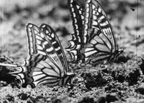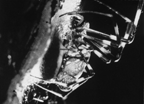Kamei Fumio Retrospective [Post-War Documentary Films]
All Must Live: People, Insects and Birds
(“Minna ikinakereba naranai: Hito, mushi, tori, Noji minzokukan”) 1984 / Color / 16mm / 80 min
1984 / Color / 16mm / 80 min
Photography, Planning: Kikuchi Shu
Sound: Kubota Yukio
Music: Fukuoka Minoru
Narrator: Hamashima Nobuko
Final Editing: Kamei Fumio
Producer: Kikuchi Fumiyo
Production Company: Tokyo Photo Laboratory
Source: Japan Document Film
 In one corner of the big city, a lot in Tokyo’s Setagaya Ward, the citizens include toads and silk spiders. The eggs laid by the toads to ensure a next generation are exterminated by pesticides sprayed by the city. Nature is destroyed in the name of urbanization, and the creation of artificial environments expands. Mr. Ohira, an urban farmer uneasy with the persuasive tactics of real estate companies, maintains the land he inherited from his ancestors. He began using organic farming methods and cooperates with a consumers group called Wakaba-kai. This film begins with composting using garden cuttings and other organic waste, the carefully depicts the various living creatures of the vegetable garden. We hear the encouragement and thoughts of the Wakaba-kai, then see the plentival harvest of tomatoes and plums. After the Bon Festival events in the middle of August, various insects start their reproductive activities for the next generation. Wakaba-kai members visit Mr. Mizuno’s apple orchard in Nagano Prefecture’s Ina area and enjoy an autumn picnic. They eat rice that has been produced without chemical fertilizers or pesticides, and consumer and producer communicate with one another. Mr. Ohira prepares for winter by putting fallen leaves on the soil and using trimmed bamboo branches to protect against frost. On the last day of the year, he makes the traditional shimenawa rope, puts it on the family altar (kamidana) and prays for a good harvest. On New Year’s Day, he goes to the Tamagawa Shrine and then visits the graves of his ancestors at Manganji temple. On January 14, he makes abohibo, a decoration made out of millets, and offers it at the family altar.
In one corner of the big city, a lot in Tokyo’s Setagaya Ward, the citizens include toads and silk spiders. The eggs laid by the toads to ensure a next generation are exterminated by pesticides sprayed by the city. Nature is destroyed in the name of urbanization, and the creation of artificial environments expands. Mr. Ohira, an urban farmer uneasy with the persuasive tactics of real estate companies, maintains the land he inherited from his ancestors. He began using organic farming methods and cooperates with a consumers group called Wakaba-kai. This film begins with composting using garden cuttings and other organic waste, the carefully depicts the various living creatures of the vegetable garden. We hear the encouragement and thoughts of the Wakaba-kai, then see the plentival harvest of tomatoes and plums. After the Bon Festival events in the middle of August, various insects start their reproductive activities for the next generation. Wakaba-kai members visit Mr. Mizuno’s apple orchard in Nagano Prefecture’s Ina area and enjoy an autumn picnic. They eat rice that has been produced without chemical fertilizers or pesticides, and consumer and producer communicate with one another. Mr. Ohira prepares for winter by putting fallen leaves on the soil and using trimmed bamboo branches to protect against frost. On the last day of the year, he makes the traditional shimenawa rope, puts it on the family altar (kamidana) and prays for a good harvest. On New Year’s Day, he goes to the Tamagawa Shrine and then visits the graves of his ancestors at Manganji temple. On January 14, he makes abohibo, a decoration made out of millets, and offers it at the family altar.Spring comes and the Wakaba-kai holds their general meeting; once again this year various living creatures go about their activities in Mr. Mizuno’s fields. A title on the screen pleads, “An environment filled with the music of birds is indispensable to human life. Don’t let us blunder into a ‘silent spring’ in which birds no longer sing.” This work was originally made as an ecological agriculture film at Kikuchi Shu’s Tokyo Photo Laboratory, but Kikuchi asked Kamei to remake it, so Kamei remade it as All Living Things Are Friends, a theme he had been thinking about for some time.
